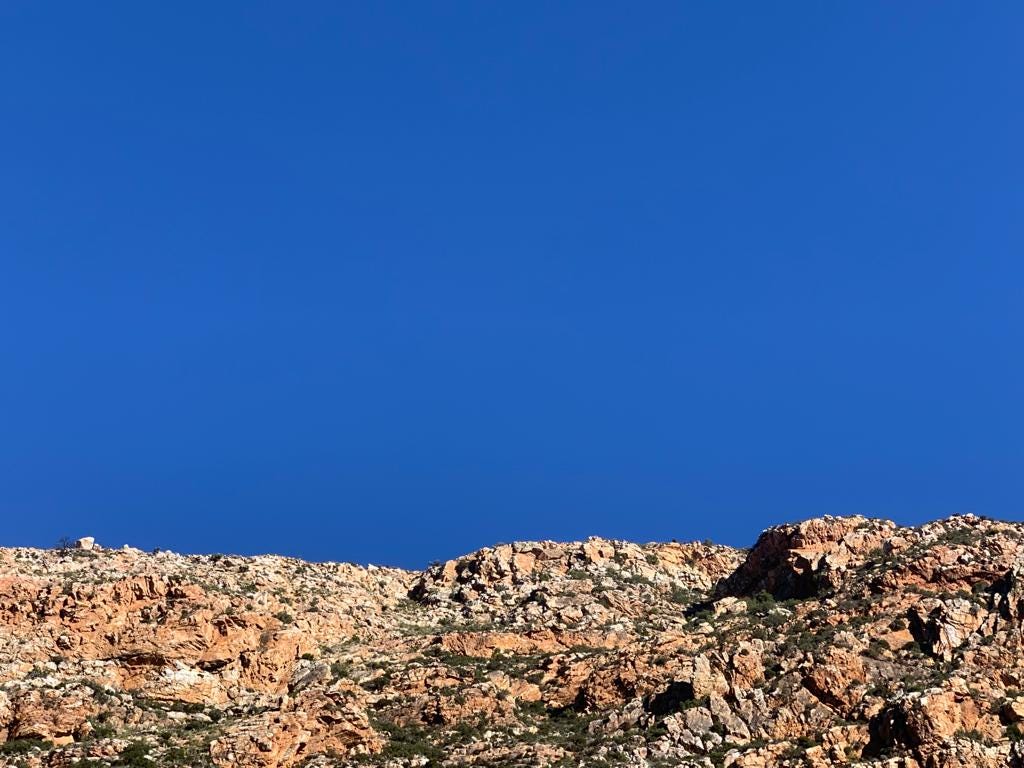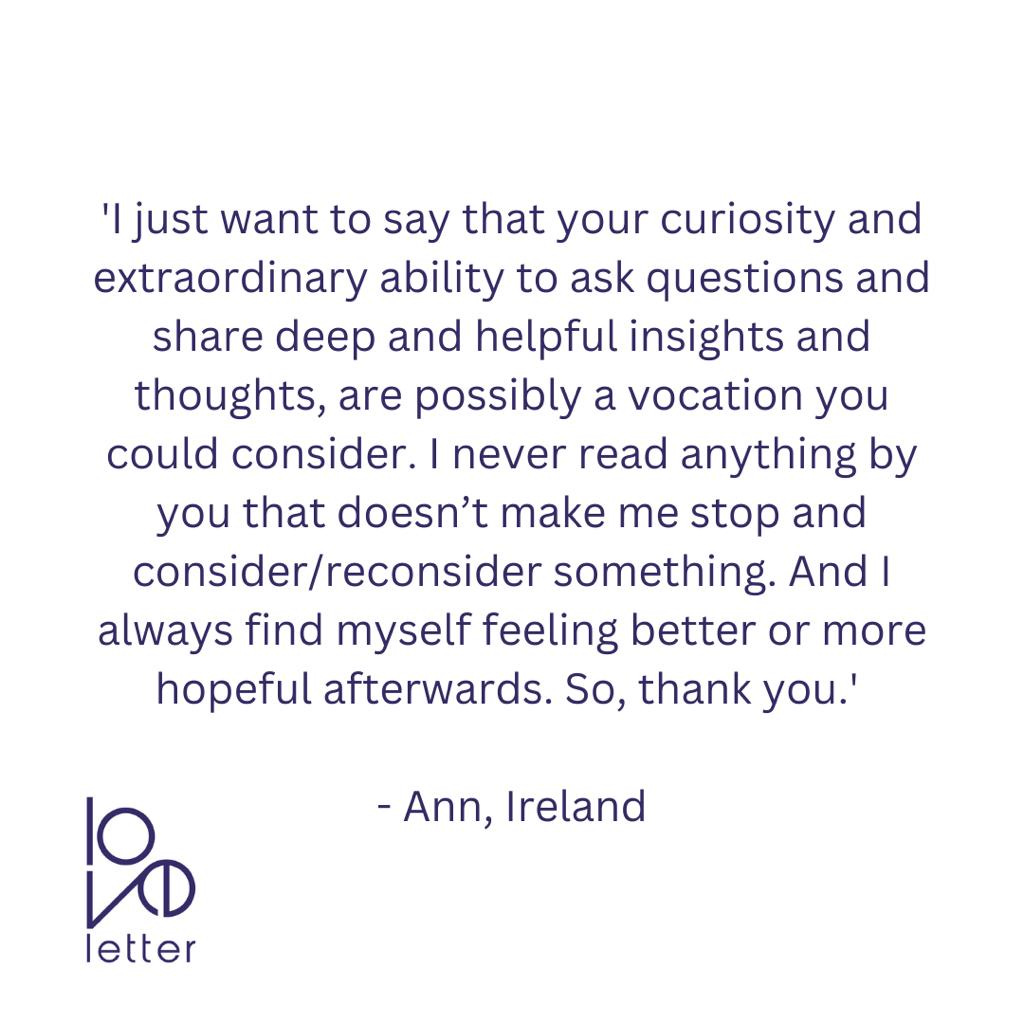It’s been a year since I moved Love Letter on to Substack and offered a paid subscriber package. This anniversary is probably no more than a little blip on your own overworked radar, but let me tell you why your decision to sign up for the paid Love Letter is not a small thing at all.

I opened paid subscriptions with the hope that I’d be able to cover the cost of spending one day a week writing what and how I want to write to people who like how and what I write.
Coming from a traditional news and publishing background, it felt like a radical and cheeky step to ask people to do that. As news reporters, one of our biggest lessons was to tuck ourselves way down the hierarchical ladder. We were servants of ‘the story’, deliverers of words about the world. We were worker ants. Our egos were kept in check by cranky, world-weary and shouty editors who worshipped at the altar of the Fourth Estate.
The whole system worked to keep writers humble before the task of the greater good of serving democracy through witnessing, reporting and fact-checking. Although the words ‘unconscious bias’ were not yet used, we were taught to check our own. We were taught to check our assumptions about everything. To check facts and the spelling of names.
Check and check and check.
Unlike writers who started out with novels and opinion pieces, reporters trained in the newsrooms of the last century are often hardy, and un-precious about their copy. To get it right, to get it quickly, and to get the reader from one paragraph to the next were the mission. News editors and subeditors chopped and changed as they saw fit. There was no place for a reporter’s egos.
All of these things are generalisations of course. There was a lot wrong – and still is – with newspaper journalism, not least of which was a lack of representation of all the kinds of people who make up the world. But there were basic ethics we were taught that have never left me.
Humility, the by-product of my time in newsrooms, is a lesson I have valued a lot of reasons, except that I realise now it took me longer to value my own voice than it might have had I started elsewhere.
All of which is to say, asking people to pay for what I have to say was pretty bloody hard and I would not have done it without the counsel of some sage professionals.
I was amazed when people immediately signed up and money started to trickle into my account. I thought I’d soon be able to cover the time it took to write the Love Letter every week.
The graph line on the subscriptions just kept going up and up. I was told to expect that between five and 10 per cent of all subscribers would probably pay. My statistics have always been at 10 per cent of my total subscribers.
Apart from what this did for my feelings of confidence, let me tell you what else your investment did:
It fed me! I had the weirdest year in which most of my work dried up. For twenty years as a freelancer, I’ve pretty much always been booked up three to six months in advance (I work mainly as an editor and translator), but suddenly this year, it all just disappeared. I wrote about it here. All my expenses back home are covered by the income from renting out my flat, but I was supposed to be earning money to keep myself fed in Europe and to add to my retirement savings. For many months, I earned nothing but what YOU paid me. YOUR money literally kept me alive.
It brought me back to writing. A few years ago I decided I was going to stop calling myself a writer because writing just doesn’t pay since the internet happened. I know I can write, but what’s the point if people no longer pay for old-fashioned journalism? I am a bloody good editor (I don’t mind saying that, even though I’m supposedly humble), but writing is where my heart is. Writing is my first and last love. Now I can finally do it regularly.
It’s probably getting me another publishing contract. Two commercial publishers who read Love Letter have approached me to write a book based on my vagabonding year. Which means I will probably publish another book next year. If that happens, I’ll make sure paid subscribers get a special deal.
It’s given me a new community. Community can sound like such a naff word, and honestly, I did not know the meaning of it in any way, shape or form, until I became an MC at a local poetry club in Cape Town in 2009. Since then, my Instagram account about books and reading has provided me with a different community. And now it’s you, my paid and most chatty and involved Love Letter subscribers. If it’s naff to be connected to people who read your words, then I am The Queen of the Naff. Or you are all the Queens of the Naff. We are all the Queens of the Naff. Together.
For all of these things, I thank you. I thank and thank and thank you. Love Letter has given me a lot of things, and you have been one of its best gifts.
Your subscription will be coming up for renewal in the next while if you are one of the first joiners. You will get an email from Substack to that effect.
If you are a monthly or annual subscriber, you might consider upgrading to a founder membership (where you choose how much more you’d like to pay than the basic fee) if you are keen to do January Reset with me in 2024.
First Founders who did January Reset at the beginning of this year are more than welcome to do it again. It was good fun and it might be nice to see how our priorities have changed this year.
I hope you’ll keep reading and sharing Love Letter with your friends and family. My subscribers are still a bit wary of or shy about the whole Substack thing, so most of the interaction comes via my inbox directly, but have I checked Substack from all angles, and it’s a wonderful platform. It isn’t controlled by algorithms and it is free of advertising. This feels politically and socially much safer than any of the other social media.
The app allows you to read notes and take part in chats (which I’ve only used for January Reset so far), so I can recommend getting it. And there are some excellent writers on here. (Let me know if you need some recommendations.)
Below is a little story from the past, written at this time of the year, when there are warm, sparkling days in the Cape in August.
Late winter in the Little Karoo
As soon as the kloof narrowed, the voices from the visitors at the hot springs ceased to rebound off the rock walls. We were funnelled through to where the reeds stood twice as tall him. An orange bird flicked out in front of me. A southern red bishop.
‘That colour!’
‘It looks like an animal from that story.’
He was referring to a story by T.Coraghesan Boyle we’d listened to together on a podcast.
We walked in silence the rest of the time, settled into the soundtrack of the day: soles crunching; the birds flapping and fossicking and shouting.
We crossed the thin stream, more mud than water, stepping on sandbags that had been thrown across. It had been a dry year. Hard to imagine the river had come down here so high and rough in the Eighties that it had entirely wiped out the old spa buildings we’d just visited. We’d looked at a display of old bottles that had been dredged up during the construction of the new hotel, including an old stone jug, a Codd-necked bottle with its marble still intact, and a Fanta bottle, unseen since the Seventies, with the light blue label painted on its side.
We’d walked to the hotel for coffee earlier. Sat on the veranda and watched families trundling prams towards the hot springs, groups of older women, unsmiling tweens and their parents weary from trying to figure out why family days out weren’t as much fun as just a year or two ago.
We had tried to enumerate the various ways in which one could tell whether a couple had been together for long or were still in the foothills of commitment.
Every second person, regardless of age, seemed to be wearing a slightly greying bathrobe. They must hang on the backs of the bathrooms doors in the rooms here like discarded skins worn again and again.
Here in the kloof, we stopped for a few minutes while I videoed the heads of the three-metre high reed forest shushing the breeze. Above the faintly moving line, the Cape fold mountains glowed in the first clear skies for weeks.
We had lain in this sun the day before, on the small square of plush lawn behind the cottage we were staying in. There was a little pond, built up with local stone, and we stayed there long enough for the skittish frog that always plopped into it whenever we opened the back door to jump on the side and reveal his gleaming algae skin to us.
We lay there long enough to become sun sleepy, to take off first one then the next item of clothing until we were down to underwear.
The next day, our thighs were tight with sunburn.
Thank you for reading Love Letter. Thank you for your support and for your letters to me.
Thank you for being my community.
Lots of love,
K.





Wonderful, as always